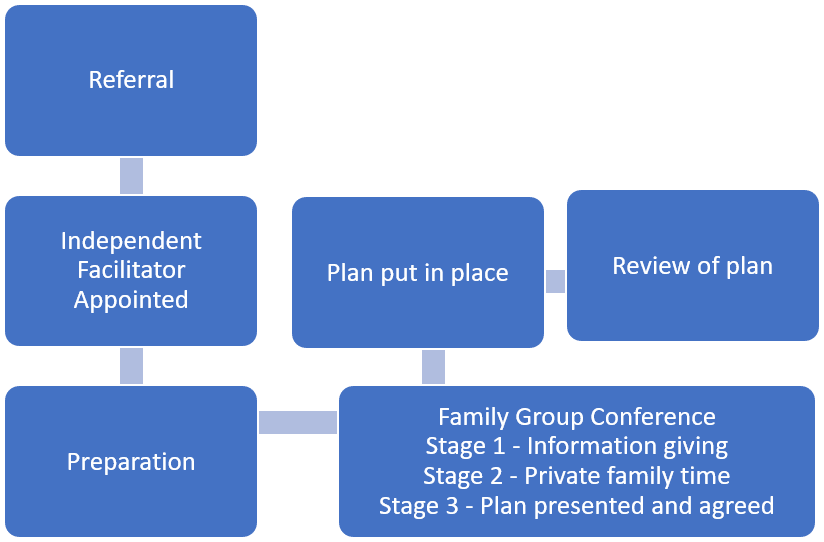WHAT IS A FAMILY GROUP CONFERENCE?
WHAT IS A FAMILY GROUP CONFERENCE?
From time-to-time, families have difficulties caring for their children and this can be for many different reasons. Family group conferencing is a way of bringing family members together in a positive way with an impartial facilitator to make a plan for their child or young person.
Who can Attend?
Before the family group conference is held, the facilitator will spend time with you and your family and explore who else needs to attend the conference. This could include members of the extended family and kin, a support person or a community elder.

FAMILY GROUP CONFERENCING FAQ
Family Group Conferencing FAQ
Contact Us

Office Contact Details
Email: info@onefuture.com.au
Phone: 02 6678 2181
PO Box 634, Banora Point, 2486
Working Hours
Weekdays: 9am to 4pm
Service Area
One Future is proud to offer its services to all of NSW Through our remote assessment service. We have large coverage of Northern NSW area from Tweed Heads, Byron Bay, Ballina, Lismore, Murwillumbah, Bangalow, Mullumbimby, Lennox, Head, Casino, Grafton, Kingscliff, Yamba, Alstonville, Brunswick Heads, Pottsville, Evans Head, Ocean Shores, Kyogle. Iluka, Maclean, Woolgoolga, Corindi Beach and Coffs Harbour. But we travel on request to any other part of NSW and interstate. We are committed to providing the highest quality assessment and facilitation services to meet your needs. Our team of qualified professionals has extensive experience working with clients from all over New South Wales and we understand the unique challenges and opportunities that come with providing services in different regions. Whether you're looking for a Independant Kinship care assessor or Independant Foster care assessor or Cultural Supports services or Family Group Conferencing Facilitator. We believe that everyone deserves access to the resources and support they need to thrive, regardless of where they live, and we are committed to delivering services that are responsive, compassionate, and effective.
LGA's Covered By One Future
The following areas are covered by One Future
Albury City, Armidale Regional, Ballina Shire, Balranald Shire, Bathurst Regional, Bega Valley Shire, Bellingen Shire, Berrigan Shire, Blacktown City, Bland Shire, Blayney Shire, Blue Mountains City, Bogan Shire, Bourke Shire, Brewarrina Shire, Broken Hill City, Burwood Council, Byron Shire, Cabonne Shire, Camden Council, Campbelltown City, Canada Bay City, Canterbury-Bankstown, Carrathool Shire, Central Coast, Central Darling Shire, Cessnock City, Clarence Valley, Cobar Shire, Coffs Harbour City, Coolamon Shire, Coonamble Shire, Cootamundra-Gundagai Regional, Cowra Shire, Cumberland City, Dubbo Regional, Dungog Shire, Edward River, Eurobodalla Shire, Fairfield City, Federation, Forbes Shire, Georges River, Gilgandra Shire, Glen Innes Severn Shire, Goulburn Mulwaree, Greater Hume Shire, Griffith City, Gunnedah Shire, Gwydir Shire, Hawkesbury City, Hay Shire, Hilltops, Hornsby Shire, Hunters Hill Municipality, Inner West, Inverell Shire, Junee Shire, Kempsey Shire, Kiama Municipality, Ku-ring-gai Council, Kyogle Council, Lachlan Shire, Lake Macquarie City, Lane Cove Municipality, Leeton Shire, Lismore City, Lithgow City, Liverpool City, Liverpool Plains Shire, Lockhart Shire, Maitland City, Mid-Coast, Mid-Western Regional, Moree Plains Shire, Mosman Municipality, Murray River, Murrumbidgee, Muswellbrook Shire, Nambucca Valley, Narrabri Shire, Narrandera Shire, Narromine Shire, Newcastle City, North Sydney Council, Northern Beaches, Oberon Shire, Orange City, Parkes Shire, Parramatta City, Penrith City, Port Macquarie-Hastings, Port Stephens, Queanbeyan-Palerang Regional, Randwick City, Richmond Valley, Ryde City, Shellharbour City, Shoalhaven City, Singleton Shire, Snowy Monaro Regional, Snowy Valleys, Strathfield Municipality, Sutherland Shire, Sydney City, Tamworth Regional, Temora Shire, Tenterfield Shire, The Hills Shire, Tweed Shire, Upper Hunter Shire, Upper Lachlan Shire, Uralla Shire, Wagga Wagga City, Walcha Council, Walgett Shire, Warren Shire, Warrumbungle Shire, Waverley Council, Weddin Shire, Wentworth Shire, Willoughby City, Wingecarribee Shire, Wollondilly Shire, Wollongong City, Woollahra Municipality, Yass Valley.


